
Have you seen the videos of babies laughing hysterically when paper is torn? For some inexplicable reason, they find it hilarious! It even became a whole trend on YouTube, so we’ve included an example here (skip any adverts at the beginning). It’s extremely funny — and the giggling baby is very cute!
Quite why the babies laugh at paper being torn, or during a game of peek-a-boo with a parent, is often a mystery. They seem to love it, though. It turns out that their ensuing laughter is very good for them, as well as being enormous fun to watch and to join in with.
Growing a Sense of Humour
 Let’s first go back to the beginning. A sense of humour is apparently a learned aspect of a person’s character, to a fair extent. It’s something that develops and changes as a child gets older, rather than something they’re born with as a result of their DNA. As such, it’s important that babies and young children are given every opportunity to enjoy laughter and, while doing so, have fun with those around them. Laughing also is also closely linked to happiness, and being happy is, of course, priceless.
Let’s first go back to the beginning. A sense of humour is apparently a learned aspect of a person’s character, to a fair extent. It’s something that develops and changes as a child gets older, rather than something they’re born with as a result of their DNA. As such, it’s important that babies and young children are given every opportunity to enjoy laughter and, while doing so, have fun with those around them. Laughing also is also closely linked to happiness, and being happy is, of course, priceless.
In one study, when babies were shown a toy duck that was then thrown to the ground, only the babies who giggled copied the action when they were given the toy. Clearly those babies understood the significance of the action and ‘got’ the joke!
The Benefits of Laughter for Little Ones
Many of the benefits of laughter are completely obvious; it cheers us up, it lightens our mood, it can make a stressful situation much more bearable and, no less importantly, laughing is fun! If we’ve laughed regularly throughout the day, we’re more likely to have enjoyed the day as a whole and we’re sure to think of it as a ‘good’ day. It’s going to be similar for babies, toddlers and under-fives.
However, there are many less obvious benefits that the very young can get from laughing regularly:
 Laughing helps children to develop better self-esteem;
Laughing helps children to develop better self-esteem;- It can help them to think a little bit differently and in a more creative way;
- In so doing, it can also help improve their problem-solving skills as they ‘may look below the surface’ more often;
- Laughing with friends, carers and parents helps closer bonds to develop;
- It can be used to cheer other children up when they are upset and thereby improve social skills and empathy;
- Laughing in the face of adversity can help boost future resilience, while also reducing anxiety;
- It helps them to be more spontaneous, more playful and also not take things, including themselves, too seriously.
Medical benefits
There are also some medical benefits for children who laugh often. Research shows that children who laugh regularly are less likely to suffer from depression and are more resistant to physical problems and illnesses. Laughing:
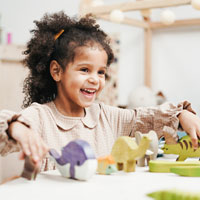 Improves mental health;
Improves mental health;- Releases endorphins (the ‘feel-good’ hormones);
- Triggers the part of the brain that improves mood;
- Lowers blood pressure, reduces blood sugar levels and improves circulation;
- Reduces heart/pulse rates;
- Strengthens immunity against illnesses;
- Helps to mask pain;
- Aids digestion;
- Children have also been shown to sleep better as they go to bed happier and more at peace.
One magical thing about laughing is that it’s also contagious — so everyone around will also benefit! Try watching that video above of the baby with the torn paper; it’s impossible not to laugh along!
In our next post, later in the month, we develop this theme further with some shareable jokes for pre-school kids and may follow up later some time with some ideas that are sure to make them laugh out loud. So, please do come back soon.
Laughter at Little Cedars Nursery
 The staff at Little Cedars Nursery in Streatham understand all about the benefits of laughter for little ones. The staff benefit from it too, of course. Life at the nursery is great fun and we ensure that babies and children are all enjoying themselves as well as learning. That’s one of the reasons why learning through play works so well. The babies and children have immense fun with lots of giggles and laughter while at the same time learning about themselves, each other and the world around them. What could be better!
The staff at Little Cedars Nursery in Streatham understand all about the benefits of laughter for little ones. The staff benefit from it too, of course. Life at the nursery is great fun and we ensure that babies and children are all enjoying themselves as well as learning. That’s one of the reasons why learning through play works so well. The babies and children have immense fun with lots of giggles and laughter while at the same time learning about themselves, each other and the world around them. What could be better!
If you would like to explore the idea of a nursery place for your child at Little Cedars day nursery in Streatham, please do get in touch. We’re perfectly located for those looking for nurseries or pre-schools in Streatham or near to Streatham Hill, Streatham Common, Streatham Park, Tooting, Upper Tooting, Tooting Bec, Tooting Common, Balham and Furzedown.
For more information call 020 8677 9675, send us a message or arrange a nursery visit here. We’ll answer any questions and would be happy to show you around.

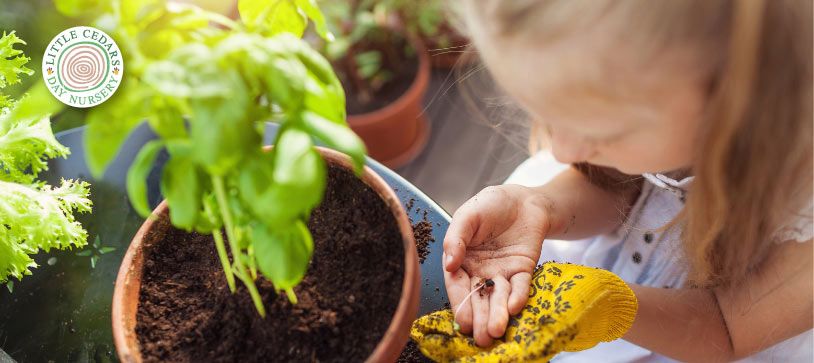
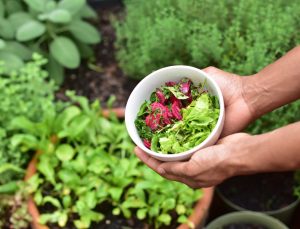 It may surprise some to learn that you can buy some vegetables and herbs just once and never have to buy them again. The secret is knowing which, and how to re-grow them. It turns out that it’s pretty easy, so we encourage parents to help youngsters get started. Once they see growing shoots or roots and, later, vegetables or herbs that the family can actually eat, they’ll be so pleased that they made this little miracle possible. What’s more, it will have taught them something about where food comes from, how to grow it sustainably and how to look after the living plants. If you’re really lucky, it may even encourage them to take things a step further and get involved in food preparation and cooking later on. It’s amazing, actually, where such a simple, fun, activity can lead!
It may surprise some to learn that you can buy some vegetables and herbs just once and never have to buy them again. The secret is knowing which, and how to re-grow them. It turns out that it’s pretty easy, so we encourage parents to help youngsters get started. Once they see growing shoots or roots and, later, vegetables or herbs that the family can actually eat, they’ll be so pleased that they made this little miracle possible. What’s more, it will have taught them something about where food comes from, how to grow it sustainably and how to look after the living plants. If you’re really lucky, it may even encourage them to take things a step further and get involved in food preparation and cooking later on. It’s amazing, actually, where such a simple, fun, activity can lead! It’s possible, and indeed fairly easy, to grow your own produce even without a garden. So long as you look after your plants and give them water, soil and light as a bare minimum, they will grow. If you don’t have a garden, perhaps you have a small courtyard or patio where you can grow in containers. If you don’t have any outside areas at all, you can grow in flower pots and other containers on window sills, balconies, under skylights and so on. This makes growing produce possible almost anywhere, including in urban London in high-rise flats. After all, it’s in a plant’s nature to want to grow.
It’s possible, and indeed fairly easy, to grow your own produce even without a garden. So long as you look after your plants and give them water, soil and light as a bare minimum, they will grow. If you don’t have a garden, perhaps you have a small courtyard or patio where you can grow in containers. If you don’t have any outside areas at all, you can grow in flower pots and other containers on window sills, balconies, under skylights and so on. This makes growing produce possible almost anywhere, including in urban London in high-rise flats. After all, it’s in a plant’s nature to want to grow.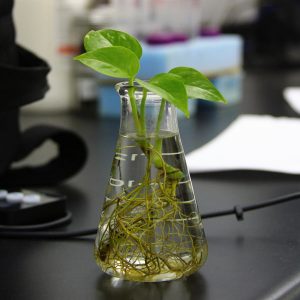 Children could start with green onions or spring onions. These are particularly easy to ‘re-grow’. Later, perhaps, the children can apply the same approach to celery, lemon grass, Cos lettuce and Pak Choy (a type of Chinese cabbage). Simply save an inch or so thick section of your shop-bought root vegetables (perhaps the last you will ever need to buy), which includes the bottom part at the root end. All your children need to do is to place that section, root end downwards, in a glass of water. Leave them in the water and, after somewhere between 1 and 3 weeks, roots will start growing. Children will love monitoring this process each day and they will enjoy looking after and caring for a living thing. Once the roots are substantial enough, children can take them out of the glass and re-pot them in soil, ideally with a bit of compost if you have any. This can be in containers, appropriately sized flower pots or in the garden if you have access to one. Before long, your plants will give your children more, free herbs and vegetables that you can all enjoy.
Children could start with green onions or spring onions. These are particularly easy to ‘re-grow’. Later, perhaps, the children can apply the same approach to celery, lemon grass, Cos lettuce and Pak Choy (a type of Chinese cabbage). Simply save an inch or so thick section of your shop-bought root vegetables (perhaps the last you will ever need to buy), which includes the bottom part at the root end. All your children need to do is to place that section, root end downwards, in a glass of water. Leave them in the water and, after somewhere between 1 and 3 weeks, roots will start growing. Children will love monitoring this process each day and they will enjoy looking after and caring for a living thing. Once the roots are substantial enough, children can take them out of the glass and re-pot them in soil, ideally with a bit of compost if you have any. This can be in containers, appropriately sized flower pots or in the garden if you have access to one. Before long, your plants will give your children more, free herbs and vegetables that you can all enjoy. Garlic cloves are also incredibly easy to regrow in a similar way. Perhaps at some point you’ve unintentionally allowed your shop-bought garlic cloves to ‘sprout’. Well, that’s how to start off. Rather than discarding them, your children can put them in water and allow roots to grow. Then, they should plant them out in soil and eventually they’ll end up with more, free, garlic cloves. What’s more, they will tend to taste more mild and delicate than shop-bought garlic — children will probably appreciate that. It’s the same with ginger roots, but allow months rather than weeks in their case.
Garlic cloves are also incredibly easy to regrow in a similar way. Perhaps at some point you’ve unintentionally allowed your shop-bought garlic cloves to ‘sprout’. Well, that’s how to start off. Rather than discarding them, your children can put them in water and allow roots to grow. Then, they should plant them out in soil and eventually they’ll end up with more, free, garlic cloves. What’s more, they will tend to taste more mild and delicate than shop-bought garlic — children will probably appreciate that. It’s the same with ginger roots, but allow months rather than weeks in their case.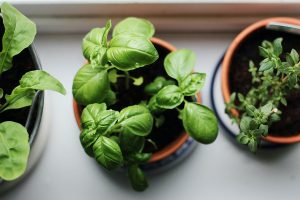 Herbs like Coriander, Rosemary and Basil can also be re-grown. Children can simply take scraps or clippings (4 inches long in the case of basil, 2-3 inches in the case of Rosemary) and place them in glasses of water in a well-lit spot on the windowsill. Once they have sprouted roots of about 2 or so inches long, these young ‘plants’ can be transplanted into soil or compost in pots. Your child will then be able to watch the plants flourish and grow into new herbs that can be harvested for food later on. The children will also soon discover that each of these herbs has a wonderful and distinctive taste and smell.
Herbs like Coriander, Rosemary and Basil can also be re-grown. Children can simply take scraps or clippings (4 inches long in the case of basil, 2-3 inches in the case of Rosemary) and place them in glasses of water in a well-lit spot on the windowsill. Once they have sprouted roots of about 2 or so inches long, these young ‘plants’ can be transplanted into soil or compost in pots. Your child will then be able to watch the plants flourish and grow into new herbs that can be harvested for food later on. The children will also soon discover that each of these herbs has a wonderful and distinctive taste and smell.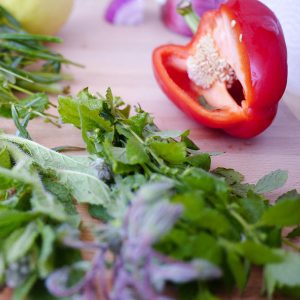 Later, when growing sprouts reach the surface, the child should keep those covered with soil (this is called ‘hilling’). Get your child to keep the soil moist but not over-saturated over the subsequent weeks. If planted in the spring, your children should be able to harvest potatoes in the summer.
Later, when growing sprouts reach the surface, the child should keep those covered with soil (this is called ‘hilling’). Get your child to keep the soil moist but not over-saturated over the subsequent weeks. If planted in the spring, your children should be able to harvest potatoes in the summer. Then, of course, your children can also experiment with nursery bought, or mail order seeds. Although not free, they’re reasonably inexpensive and also fun for children to grow if you follow the instructions and timing suggested on the seed packets. Beans of various kinds and sugar snaps are particularly easy to grow and usually result in an excellent crop. They will benefit from being in a garden or outdoor patio area, ideally, due to the space they require. They will need more vertical space than horizontal space, however, so even balcony planting may be possible if you have suitable grow bags.
Then, of course, your children can also experiment with nursery bought, or mail order seeds. Although not free, they’re reasonably inexpensive and also fun for children to grow if you follow the instructions and timing suggested on the seed packets. Beans of various kinds and sugar snaps are particularly easy to grow and usually result in an excellent crop. They will benefit from being in a garden or outdoor patio area, ideally, due to the space they require. They will need more vertical space than horizontal space, however, so even balcony planting may be possible if you have suitable grow bags.
